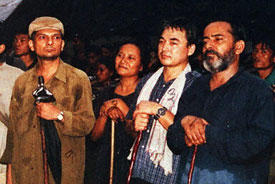 King Gyanendra’s government may be forgiven for shrugging off the unilateral truce declared by the Maoist rebels in Kathmandu Valley. With the Seven-Party Alliance (SPA)’s much-hyped “massive showdown” with the palace looming, Maoist supremo Prachanda has decided to take the peace route to the Nepalese capital.
King Gyanendra’s government may be forgiven for shrugging off the unilateral truce declared by the Maoist rebels in Kathmandu Valley. With the Seven-Party Alliance (SPA)’s much-hyped “massive showdown” with the palace looming, Maoist supremo Prachanda has decided to take the peace route to the Nepalese capital.During their decade-old “People’s War,” the Maoists have succeeded in mounting daring attacks on district capitals and inflicting heavy blows on the state. However, they have lacked the ability to hold on to their “conquests” even for a few hours. So much for the rebels being in control of 80 percent of Nepal.
Prachanda evidently recognizes the futility of triumphalism as long as Kathmandu valley remains out of bounds. The Shining Path, the Maoist organization in Peru from which the Nepalese rebels draw inspiration, was thought to have been in control of 95 percent of the Andean nation. Once Comrade Gonzalo was in the grip of the Peruvian security forces and found himself paraded in a cage, the Maoists there lost their luminosity.
Instead, Prachanda has decided to rally behind the SPA in an effort to foment the overdue urban insurrection that would catapult him to power. The Maoists’ latest unilateral ceasefire is clearly aimed at absolving their organization of responsibility for any outbreak of violence.
The peace route has worked well for the rebels. Last week, Maoists bombed a high-school test center in western Nepal, injuring teachers and students. The rebels came out with a statement clarifying that such attacks were not part of their movement.
Earlier this year, the Maoists gave an explicit pledge to Ian Martin, the top UN human rights monitor in Nepal, that they would not physically attack candidates standing in the municipal polls the royal regime was organizing as part of its three-year roadmap to democracy. The Maoists actually killed two leading candidates and injured others. Martin saw no reason to hold the Maoists to their pledge, but that’s a different story.
The SPA is either unaware of the rebel ploy or is totally consumed by hatred of the palace for having exposed the hollowness of the multiparty democracy the Nepali Congress and the Unified Marxist Leninists crafted at the instigation of their Indian mentors.
The royal regime has branded the upcoming protests as a Maoist-driven campaign and has vowed to repulse this challenge to its authority. The rebels’ ceasefire is unlikely to change the government’s stand because it can see through the rebels’ deceit. During the last unilateral ceasefire, the Maoists continued with much of their terrorist activities – murder, kidnappings, extortion, etc. If they desisted from high-profile attacks on government installations, it was merely to rearm and reorganize for a deadlier spree of murder and mayhem.